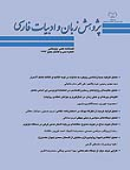تحلیل فرایند فردیت از نظرگاه یونگ در «اسکندرنامه» نظامی
محورهای موضوعی : پژوهشهای ادبیات کلاسیک ایرانمریم حسینی 1 , سولماز دهقانی 2
1 - دانشگاه الزهرا
2 - دانشگاه الزهرا
کلید واژه: اسکندرنامه کهنالگو فرایند فردیت اسکندر یونگ,
چکیده مقاله :
دو منظومۀ شرفنامه و اقبالنامه حکیم نظامی گنجوی که به اسکندرنامه شهرتیافته، سرگذشت سفرها و جنگ های اسکندر مقدونی است. نظامی در آفرینش این دو منظومه علاوه بر استفاده از وقایع تاریخی از داستان های اسطوره ای و افسانه ها نیز استفاده کرده و طرحی نو درانداخته است. اسکندر در این دو منظومه، آن سردار فاتح تاریخ نیست، بلکه شخصیتی اسطوره ای و پیامبرگونه دارد که تمامی نیروهای زمینی و فرازمینی، او را در راه پر فراز و نشیب سفرها و طی فرایند فردیت و مسیر شناخت خویشتن یاری می دهند. اسکندر در شرفنامه، حکیمی است که در پی کسب حکمت، راهی آفاق شده و در اقبالنامه در قالب یک پیامبر، سفری انفسی را تجربه می کند. نقد روان-شناسانۀ این دو منظومه نشان می دهد که این شاه جوان در سفرها با هر یک از عناصر ناخودآگاهی از جمله: سایه، آنیما و پیر خرد دیدار می کند و سرانجام به خود و حقیقت والای وجود دست می یابد. هدف این مقاله، تحلیل این کهن-الگوها با تکیه بر دیدگاههای یونگ است.
The two epopees, Sharafnameh (The Letter of Dignity) and Eqhbalnameh (The Letter of Luck) by Hakim Nezani Ganjavi, which are known as Eskandarnameh, are stories about the travels and wars of Alexander of Macedon. In the creation of these epopees, Nezami employs not only the historical events, but also the myths and legends, and has created a new pattern. In these two epopees, Alexander is not that famous conqueror in the history, but he is a legendary and prophet-like character whom all the earthly and unearthly forces helped through the vicissitudes of his journeys, and throughout the process of developing individuality, and the path of self- awareness. In Sharafnameh, Alexander is a sage who departed on a journey to gain wisdom. However, in Eqbalnameh he experiences an inner journey as a prophet. Psychological analysis of these two epopees indicates that this young king, encounters the elements of unconsciousness, such as: Shadow, Anima, and the Wise old man in his journeys. Eventually Alexander achieves selfhood and the sublime truth of existence. This article aims at analyzing these archetypes based on Jung’s views.
